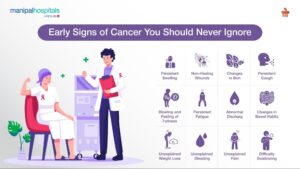
Early Cancer Signs You Might Be Missing
Cancer doesn’t always announce itself with dramatic symptoms. In fact, some of the earliest warning signs are subtle—so subtle that many people brush them off as stress, aging, or something minor.
But early detection saves lives. When caught early, many types of cancer can be treated more effectively and even cured.
Here’s what to watch for—the often-overlooked signs your body might be trying to send you.
Also check for : toxic-homes-health-hazards-lurking-in-your-house
1. Unexplained Weight Loss
If you’re shedding pounds without changing your diet or activity level, it could be more than a metabolism shift. Sudden, unexplained weight loss is one of the most common early signs of cancer—especially pancreatic, stomach, lung, or esophageal cancers.
🚩 Red flag: Losing more than 10 pounds without trying, over a few months.
2. Persistent Fatigue
Not just “I’m tired after work”—this is deep, ongoing exhaustion that doesn’t improve with rest. Cancer-related fatigue may be caused by the cancer itself, or by your body working hard to fight it.
Common in: Leukemia, colon cancer, or stomach cancer
3. Unusual Lumps or Swellings
A new lump, bump, or swelling—especially in the breast, testicles, lymph nodes, or neck—deserves immediate attention. While many are benign, painless lumps are sometimes the first sign of a tumor.
✔️ Regular self-exams can help you detect changes early.
4. Changes in Skin
Your skin can reflect deeper health problems. Watch for:
-
Darkening or yellowing
-
Sores that don’t heal
-
New or changing moles
-
Excessive itching or redness
🚩 A mole that changes size, shape, or color may signal melanoma, a dangerous form of skin cancer.
5. Chronic Pain
Pain that doesn’t go away—especially in the back, pelvis, head, or abdomen—may be an early sign of cancer.
For example: Back pain is sometimes linked to bone or ovarian cancer.
Don’t ignore pain just because it’s dull or occasional. If it lingers for weeks, get it checked.
6. Changes in Bowel or Bladder Habits
Any long-term shift in your digestive or urinary patterns can signal trouble:
-
Diarrhea or constipation lasting over a week
-
Narrow, pencil-thin stools
-
Blood in urine or stool
-
Frequent urge to urinate
May be early signs of colon, bladder, or prostate cancer.
7. Persistent Cough or Hoarseness
A lingering cough, hoarseness, or difficulty swallowing isn’t just an allergy flare. If these symptoms last longer than 3 weeks, especially in non-smokers, they need further evaluation.
Potential sign of lung, throat, or thyroid cancer.
8. Unusual Bleeding
Any unexpected bleeding should be taken seriously:
-
Postmenopausal spotting
-
Blood in urine, stool, or vomit
-
Coughing up blood
-
Frequent nosebleeds
May indicate cervical, colon, bladder, or lung cancer.
9. Sores or Lesions in the Mouth
Mouth cancers are often missed in their early stages. Watch for:
-
White or red patches on gums or tongue
-
Non-healing sores inside the mouth
-
Persistent mouth pain
Especially important if you smoke or drink alcohol regularly.
10. Swallowing Difficulties
If food feels like it’s sticking in your throat, or you experience pain while swallowing, it might be more than heartburn.
Could point to esophageal or throat cancer.
11. Unexplained Fevers or Infections
Frequent infections or low-grade fevers may be your body’s early response to cancer—particularly blood cancers like leukemia or lymphoma.
12. Changes in Breast or Nipple Appearance
Beyond lumps, early breast cancer signs include:
-
Dimpling or puckering of skin
-
Inverted nipples
-
Redness or scaling
✔️ Monthly self-checks and yearly clinical exams are key.
When to See a Doctor
You know your body best. If something feels “off” and lingers for more than 2–3 weeks, don’t wait. Speak to your doctor—especially if:
-
The symptom is new or worsening
-
You have a family history of cancer
-
You’re over age 40 (when risk increases)
Early action can make all the difference.
Lowering Your Cancer Risk
While not all cancers can be prevented, healthy habits dramatically reduce your risk:
✅ Eat a plant-rich diet
✅ Exercise regularly
✅ Avoid tobacco and limit alcohol
✅ Use sunscreen daily
✅ Get regular screenings (mammograms, colonoscopies, etc.)
Final Thoughts
Cancer doesn’t always roar—sometimes, it whispers.
By listening to your body and staying alert to subtle changes, you empower yourself to act early. And when it comes to cancer, early detection often means better outcomes and better chances of recovery.
Don’t panic over every ache or bruise—but don’t ignore the signs either. Your health is worth the second look.